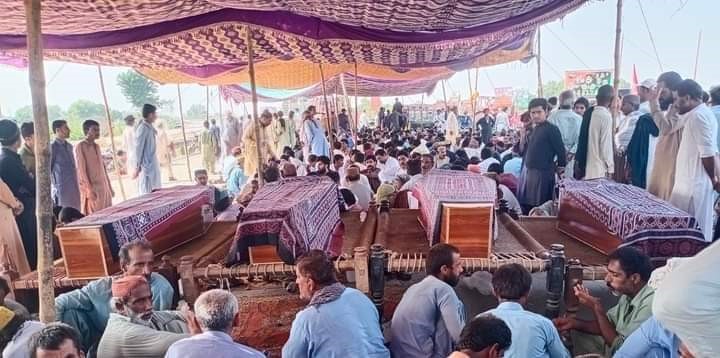
Sindh suffers from poverty, illiteracy, corruption, insecurity, environmental degradation, poor governance, nepotism, and mismanagement
Prof Dr. Abdullah G Arijo
Sindh’s sufferings have been a topic of discussion and debate among scholars, activists, and politicians since long. Despite having a rich and diverse cultural heritage, and contributing a lot in national economy with its sea ports, trade, industries, natural resources like gas and petroleum besides huge coal reserves and the electricity produced from it, this Pakistani province has encountered numerous challenges and injustices.
The injustices committed to Sindh during last 75 years cannot be penned down in a single article therefore I would focus on the current situation prevailing in Sindh.
The very recent incident having taken place in Sindh is killing of four innocent villagers and injuries to nine others during a raid by law enforcing agencies in a village near Sakrand. The incident has sparked condemnation from across Sindh and raised concerns about law and order in the province. A ‘thorough investigation’ has been ordered by the caretaker chief minister. The incident has caused grief and anger among the relatives and friends of the victims, who have demanded justice and accountability for the perpetrators.
The security officials’ violence and brutality during the incident in Sakrand have left residents feeling fearful and insecure. This has led to protests and demonstrations by political and civil society groups, who are condemning the human rights violations and calling for an impartial inquiry into the matter.
The recent incident has brought to light the inadequate governance and lack of coordination among law enforcement agencies, resulting in a failure to safeguard citizens’ lives and property. This occurrence has emphasized the necessity for reformation and enhancement in the law-and-order situation in Sindh, particularly in rural regions where crime is a frequent occurrence.
Sindh always has an unending list of sufferings. This include forced conversions and marriages of Hindu girls and women.
The caretaker chief minister of Sindh, Justice ® Maqbool Baqar, ordered a detailed probe into the incident and formed a three-member committee to investigate the matter and submit a report within four days. A committee led by Hyderabad Commissioner Syed Khalid Hyder Shah is investigating, with members from the police and special branch.
The committee’s task is to ascertain the causes behind the clash that resulted in the loss of lives and injuries to law enforcement personnel.
The government as usual has also expressed its concern over the law-and-order situation in Sindh and vowed to provide all resources to law enforcement agencies to maintain peace and security in the province.
Sindh always has an unending list of sufferings. This include forced conversions and marriages of Hindu girls and women. According to the Human Rights Commission of Pakistan (HRCP), there were 31 cases of forced conversions reported in Sindh in 2020, mostly involving Hindu girls and women who were abducted, married to Muslim men, and converted to Islam against their will1. The HRCP also noted that the existing laws and mechanisms to protect the rights of religious minorities were inadequate and ineffective and the issue remains the same as ever.
Violence against women and children. According to the Aurat Foundation, a women’s rights organization, there were 2,297 cases of violence against women reported in Sindh in 2020, including 403 cases of murder, 249 cases of rape, 138 cases of domestic violence, and 118 cases of honor killing2. The foundation also reported that there were 1,304 cases of violence against children reported in Sindh in 2020, including 189 cases of murder, 178 cases of sexual abuse, 112 cases of kidnapping, and 106 cases of torture.
Enforced disappearances and extrajudicial killings are also common. According to the Commission of Inquiry on Enforced Disappearances (COIED), there were 1,226 cases of enforced disappearances pending in Sindh as of December 2020. The COIED also noted that many of the victims belonged to ethnic and political groups, such as Sindhi nationalist parties, and the Baloch nationalist parties. According to the HRCP, there were also reports of extrajudicial killings by the police and other security agencies in Sindh, especially in Karachi. The HRCP also expressed concern over the lack of accountability and transparency in the use of force by law enforcement agencies.
Sindh is a province of Pakistan that has a rich and diverse cultural heritage but has also faced many challenges and injustices in the past and present.
Drought and malnutrition in Tharparkar are yet another suffering. According to the Sindh Health Department, there were 650 deaths of children under five years old due to malnutrition and other diseases in the Thar district of Sindh in 2020. The district has been facing a chronic drought since 2013, affecting the livelihoods and health of millions of people, especially the indigenous communities but there is no policy to end the issue. According to the UNICEF, more than 40 percent of children under five years old in Thar are stunted, while more than 17 percent are wasted. The UNICEF also noted that the district lacks adequate health facilities, water supply, sanitation, and education services.
Sindh is a province of Pakistan that has a rich and diverse cultural heritage but has also faced many challenges and injustices in the past and present.
Under British rule, Sindh was annexed in 1843 and subjected to exploitation. The British imposed their laws and administration without regard for local customs and separated Sindh from its historical and cultural connections with other regions of India.
India’s partition in 1947 led to Sindh becoming a part of Pakistan. However, Sindhis were discriminated against by the Punjabi-dominated government, leading to their marginalization and deprivation of rights. The settlement of Indian refugees in Sindh also changed its demographics.
For various periods spanning more than three decades, Pakistan was ruled by the military. During this time, the military dictators suppressed the democratic movements and aspirations of the Sindhis, who sought greater autonomy and representation for their province. Additionally, the military regimes imposed martial law, censorship, repression, and violence on the Sindhis, who resisted their policies and actions. Furthermore, the military rulers supported religious extremism and sectarianism in Sindh, which endangered its secular and pluralistic values.
Sindh, a less developed province in Pakistan, suffers from poverty, illiteracy, corruption, insecurity, and environmental degradation. It also struggles with poor governance, nepotism, and mismanagement by authorities. Environmental issues such as water scarcity, floods, droughts, pollution, deforestation, and climate change further add to its challenges.
____________
 Prof. (R) Dr. Abdullah G. Arijo is Advisor and Visiting Professor, SBBUVAS, Sakrand, Pakistan. He is Ex-Chairman, Department of Parasitology, Sindh Agriculture University and Ex-Advisor Academics & P&D to Vice Chancellor SAU Tandojam
Prof. (R) Dr. Abdullah G. Arijo is Advisor and Visiting Professor, SBBUVAS, Sakrand, Pakistan. He is Ex-Chairman, Department of Parasitology, Sindh Agriculture University and Ex-Advisor Academics & P&D to Vice Chancellor SAU Tandojam